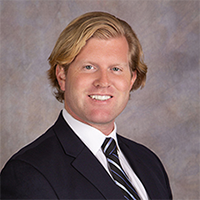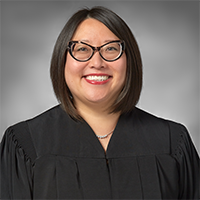Tips from the Bench: Hon. Judy S. Bae — “Life is Not About the Destination but the Journey”

Associate Attorney at Klinedinst PC
From Certain to Uncertain Career Path
Life is not so much about the pre-planned destination but is about the journey that leads us to where we were meant to be all along. The Honorable Judy S. Bae’s legal career path to becoming a lawyer and a judge is a testament to this maxim. Judge Bae grew up in Redlands, California and was raised by two physicians who worked at local teaching hospitals. As a young Asian American student, talented in the sciences, and with educated and supportive parents, it was almost pre-destined that Judge Bae would follow in her parent’s footsteps and become a physician.

It was not until the end of her second year of medical school when Judge Bae began to seriously question her path. She was not enjoying medical school. Judge Bae decided to take time off from her schooling and work as a secretary for her old biology department at her undergrad, as well as explore an entirely new subject area by auditing business and accounting classes. To her complete surprise—and the surprise of many others—she was captivated by a Uniform Commercial Code Sales class. It was at this point that she was struck with the thought that a legal career may be her calling.
From Deal-Maker to Story-Teller
Judge Bae decided to attend law school close to where she grew up at the University of San Diego. She enjoyed the intellectual side of the law and believed she wanted to be a transactional attorney—drawing up contracts and making deals. Judge Bae also preferred transactional law because she did not like public speaking and she did not see herself as an over-zealous bulldog who would enjoy a life of as a trial attorney. As one often does in law school, Judge Bae wanted to gain perspective through experience, which led her to intern with the San Diego County District Attorney’s Office and a local insurance defense law firm. Both of these experiences were invaluable to her. Judge Bae’s experience at the District Attorney’s office taught her that the courtroom is not as daunting as it looks from the outside, and her experience from the civil defense firm taught her the importance of chasing the story and telling the client’s narrative. It was at this point that the light bulb went off in her head and she realized she did not need to be a bulldog litigator, but instead she could convey to the court and a jury a compelling story about her clients. With this understanding and her self-realized interest in seeking to learn and comprehend the human condition, Judge Bae would go on to have a 17-year career litigating civil and probate matters.
From Lawyer to Judge
Much like how Judge Bae never envisioned herself being a lawyer, she also never perceived herself becoming a judge. As a young Asian American female attorney, Judge Bae just did not look or sound like the judges that she was accustomed to appearing before. She was not politically well connected, nor did she have a degree from an Ivy League school. She had not tried a hundred jury trials. To her, she simply was not the typical candidate for a judicial office, so the thought of applying to be a judge never crossed her mind.
After the Great Recession in 2008, Judge Bae realized job security was never a given, so she figured it would be wise to become more involved with her local San Diego legal community. In doing so, she became active with the San Diego County Bar Association (“SDCBA”), the Honorable William B. Enright Inn of Court (“Inn”), and Pan Asian Layers of San Diego (“PALSD). She quickly realized the overlap between attorneys in these three organizations and she started making career connections. This afforded her a level of comfort and security, knowing that she would have other legal professionals to turn to if her employment were to be jeopardized. Judge Bae eventually was elected to the board of SDCBA, joined the Executive Committee for the Inn, and she became the president of PALSD.
Judge Bae’s leadership roles with these organizations allowed her to meet and interact with members of the judiciary who often encouraged her to apply for a position. All too modestly Judge Bae shrugged these words of encouragement off as mere acts of kindness, because she did not believe that she was judge material. Finally, after two and a half years of questioning her qualifications, she decided to submit her application. As fate would have it, Judge Bae was one of the first groups of judges appointed to the bench by Governor Gavin Newsom—and again she began traveling down an unfamiliar path that she had never foreseen for herself.
Advice to New Attorneys
Judge Bae encourages new lawyers to take a chance and practice in different fields of work, as you might never know what may pique your interest. Much like her journey to becoming a lawyer and a judge, sometimes you just need to take a chance and forge a new path to figure out where you are truly meant to be. Judge Bae has found her career to be incredibly rewarding, and she enjoys her current position as a public servant—going where the court tells her to and the people need her.
Judge Bae’s advice for new attorneys is to always be prepared and to know where your case currently is and to understand how to progress the case to resolution. The better prepared a litigator is for a hearing the smoother the process will be for everyone. She encourages new attorneys to avoid “puffery” and to be honest when they do not have the answer to a question. She does not expect attorneys to always have answers; the practice of law is operating in constant uncertain gray areas and often there are no clear answers.
Lastly, Judge Bae wants to remind new lawyers to remain civil and adhere to their duty of candor. Often new lawyers think they must be aggressive and hostile to opposing counsel, which usually has detrimental effects and unnecessarily delays litigation. She is mindful of how small the San Diego legal community is and how long it takes to build a good reputation, but how quickly it can be destroyed. Keep in mind: just as much as attorneys enjoy talking about judges; judges talk about attorneys; and attorneys talk about one another. Word can spread quickly if you have a negative reputation, which could adversely impact future jobs, attracting clients, and achieving success in the courtroom.
Despite Judge Bae’s early career plans, life has taken her on an interesting journey to a career of public service. Often, we plot out the destination and lose track of the journey, but it is the journey that’s the most important and we end up where we were supposed to have ended up all along. Judge Bae reminds us that those little jobs and terrible tasks assigned sometimes have a much greater impact on our lives than you may realize at the time. The terrible bosses are sometimes the best lessons on how not to be a human, lawyer, or future boss, and often teach more important lessons than the amazing boss. Later you will look back on the sum of your experiences and realize and appreciate that they are what led you to today. So go ahead, take a chance, try something new—for you will never know if it was truly meant to be. Judge Bae’s path to the judiciary resonates with us all and can be summarized by Robert Frost: “Two roads diverged in a wood, and I – I took the one less traveled by, And that has made all the difference.”